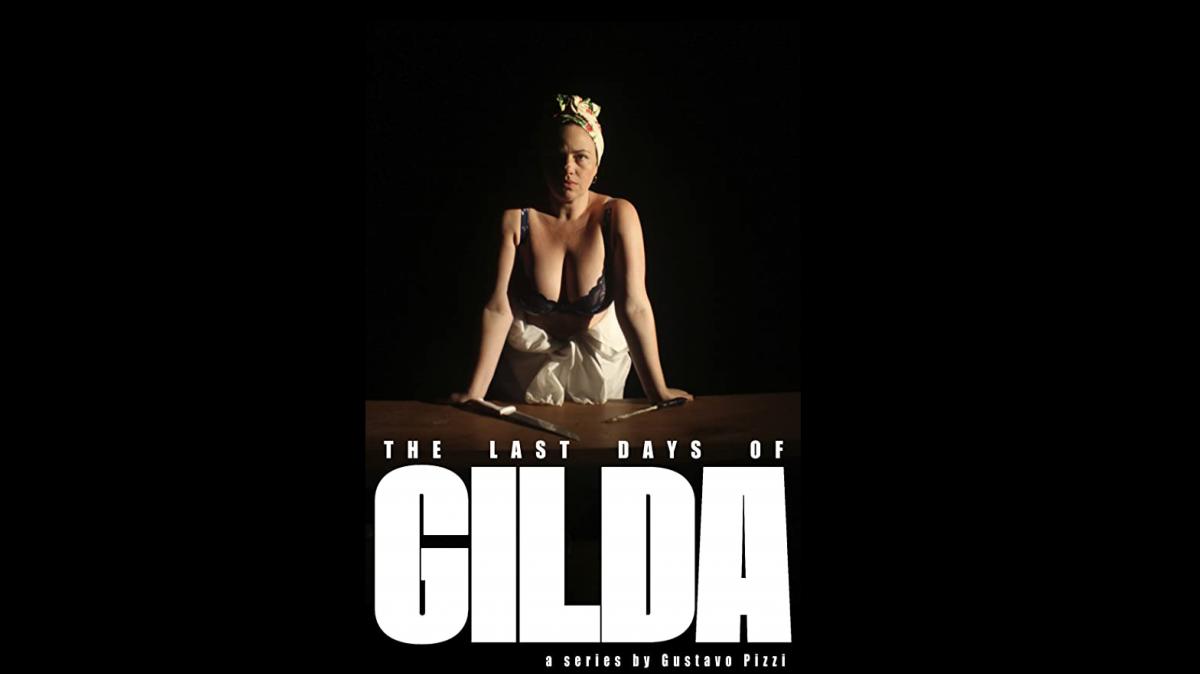"They say that freedom is a constant dying
Oh lord we’ve died for so long
We must be free, we must be free"
GILDA: What is it with this wonderful name? Can anyone imagine an unattractive Gilda? We have had the magical 1946 ‘Gilda’ with Rita Hayworth and Glenn Ford, then, more recently ‘I’m Gilda’ (2016) about the life and tragic death of the lovely and popular Argentine singer of the 1990s called Gilda.
Already the message is loud and clear in the opening credits.
Gilda,( played by Karine Teles) seductive and sexy, dressed in her underwear, calmly sharpens a huge knife. This reminds us that she is also warning everyone that you do not mess with Gilda. We know there will be blood. And indeed, there is plenty of blood. She rears chickens and pigs in her back yard. Dressed as if for a pandemic in total PPE, Gilda (Karin Teles) and one of her lovers Inácio (Lucas Gouvêa) slaughter and butcher a pig. The cuts are packaged for sale. It is carried out with an unexpected professionalism despite the unusual setting.

Karine Teles as Gilda
Gilda is an independent, sexually confident woman. With her generosity of spirit, she loves music, food and above all, men. She has a string of lovers and has no problem attracting more, she is an uninhibited, voluptuous, warm and loving person, happy to share with her friends when the occasion arises. ‘Gilda is a metaphor for whom we would like to be’.
But, in this modest suburb of Rio de Janeiro, this love of freedom does not fare well with her prejudiced and religious neighbours, who are whipped up into frenzies by the aspiring Savonarola Pastor Isaías (Bruno Balthazar). The Pastor fancies himself the top authority in the area. With evangelical extremism, he tries to introduce a divisive and fascistic way of life. He teams up with a weak young man, Ismael, (Higor Campagnaro), who has been persuaded to stand for councillor of the Lord’s Party. From the start Gilda is on a confrontational course with them, by refusing to allow political posters on the front of her house as the campaign gets under way. This provokes the fury of the wife of the campaigning councillor’s wife Cacilda (Julia Stockler), who blames Gilda for all her misfortunes, regardless of evidence.

Filming The Last Days of Gilda
The enmity towards Gilda and those who do not conform with the Pastor Isaías’ ideals, is actively encouraged by Cacilda. Hate and lies about Gilda spread through the community. The local Candomblé priestess, Mãe Teresa’s home, is daubed with hate graffiti because her faith is considered heretical and the work of the devil. Incited by the pastor, these antagonistic emotions gradually consume everyone around, with Gilda’s house daubed with graffiti and every insult going. The danger from encroaching violence grows by the day. No purification is strong enough. Drug dealers start to move in, threatening and killing, with no police presence to control it. The local cop, Wallace (Antonio Saboia) tries to protect his community, but his own colleagues turn out to be his worst enemies. Gilda stands her ground, despite being seriously threatened and branded a witch, together with Mãe Teresa.
There are unsettling scenes when a mob, led by the Pastor and Cacilda turn against Gilda, despite her exuberance and courage, she is almost beaten. The local police are corrupt and the drug gangs are not controlled. Even so, the reality in a Rio de Janeiro suburb is probably a great deal worse. But, as Mãe Teresa insists, “We face Hate with Love”. Gilda judges no one, not even Cacilda, her angry and tormented neighbour. Despite the difficulties, she always manages to respond with tenderness and warmth and, with the other saner members of the community, she refuses to be driven out, despite the very real dangers.
“Fear will not silence us” they sing and dance to a samba.

Karine Teles as Gilda
Gilda not only excels in love and love-making, her culinary skills are unmatched, True to form, she transports her friends and lovers with food offerings that take her and them onto another level. There are ‘floating’ scenes of magic realism that evoke the senses with the richness of her cooking, you can almost smell it as you watch.
So, in many ways, this is a story that feels like a fairy tale, as it takes us on an entertaining and interesting journey with Gilda, into her exuberant world, reminding us of the dynamics at play that make Brazil so vibrant.
The mini-series ends on an uplifting note. Astonishingly, the film was shot in only twelve days, between two rounds of the 2018 Brazilian presidential elections, with everyone on the team agonizing over the threat to the future of the film industry in Brazil. This was a good response, ‘we will overcome’, as John Lennon would have said.

Gilda and supporters
Lead actor and co-writer of the series, KarineTeles, is superb as Gilda, in a role to die for, which she co-wrote with her ex-husband, colleague and director of the series, Gustavo Pizzi. Gustavo Pizzi is a Brazilian screenwriter and producer. His last film ‘Loveling’(2018) premiered at the Sundance Film Festival and ‘The Last Days of Gilda’ (2020) was selected by the Berlinale Series 2021.
For local distribution watch this space. Currently available in Brazil Globostat HD (Canal Brasil) TV.
The Last Days of Gilda (2020)
Director Gustavo Pizzi
Writers Gustavo Pizzi and Karine Teles
Producers Gustavo Pizzi / Carlos Eduardo Valinoti
Original Music Pedro Sodré and Rudah
DOP Pedro Faerstein
Editor Alice Furtado
Art Director Dina Salem Levy
Sound Federico Massine/
Sound designer mixer François Wolf
Company credits Baleia Filmes / Nostro















